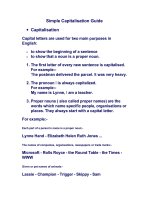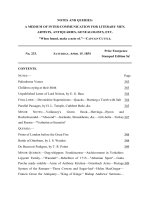- Trang chủ >>
- Đề thi >>
- THPT Quốc Gia
s2002 notes
Bạn đang xem bản rút gọn của tài liệu. Xem và tải ngay bản đầy đủ của tài liệu tại đây (245.33 KB, 6 trang )
STUDY NOTES
EPISODE 2: GINSENG
COLLOCATIONS
STUDY TIPS
When producing formal language in essays,
report writing, and letters, or communicating
in formal or informal situations, it is
important to express yourself and convey
meaning as clearly, precisely and accurately
as possible.
This can be achieved in part by choosing
the right word combination or collocation.
Moreover, using the right collocation will
make your writing and speech sound more
natural and closer to that of a native
speaker.
COLLOCATION – WORD COMBINATION
Using collocations appropriately is
vital for communicating in English
competently, and producing
native-like writing and speech.
Whenever reading or listening, be
on the look out for any new word
combinations to expand your
database of collocations. This will
be an indispensable tool in
assisting you with your spoken and
written language.
Building your collocation
vocabulary and databases will also
be of benefit for both the IELTS
Writing and Speaking tests.
Collocation is a term used to describe the
way particular words in English combine
and occur together regularly and commonly. For example, in English we say a ‘short
film’ and ‘long walk’ but not a ‘small film’ or ‘large walk’. The adjectives ‘short’ and
‘long’ collocate naturally with ‘film’ and ‘walk’. Their usage is common and
predictable. So also is ‘small house’ and ‘large family’ but not ‘short house’ and ‘long
family’. Though word combinations are predictable for native speakers, they are not
predictable for students of English who will need to learn them as they learn new
vocabulary. With practice, using collocations will become second nature.
TYPES OF COLLOCATIONS
There are different types of word combinations, including:
adjective + noun
~
+ friend
best, close, family, good, great, old, special, school friend
adjective + noun
strong + ~
strong chair, current, drug, leader, swimmer, team, supporter
verb + noun
~
+ friends
become, have, make, remain, stay, and win friends
Page 1 of 6
verb + adverb
decrease + ~
decrease considerably, dramatically, gradually, significantly
adverb + adjective
~
+ friendly
extremely, genuinely, naturally, really, reasonably, very friendly
short phrases with specific word order
rain or shine; salt and pepper; rise and shine; pick and choose; safe
and sound; hot and cold; left, right and centre; head and shoulders;
hard and fast; dollars and cents
defined sets of words
points of the compass: north, south, east, west
days of the week: Sunday, Monday, Tuesday, Wednesday, Thursday,
Friday, Saturday
months of the year: January, February, March, April, May, June, July,
August, September, October, November, December
seasons: summer, autumn, winter, spring
COLLOCATION NOTEBOOK
When learning collocations it is helpful to have a collocation notebook as a kind of
database to which you can refer, especially when writing.
Organising the word combinations according to a topic and/or headword (main
word) allows you to readily find appropriate and more precise expressions. For
example, when writing on a topic about the environment, by looking through your
database under the topic Environment you would have at your fingertips such
collocations as: ‘adapt to a new environment’, ‘environment spokesperson’,
‘conservation of the environment’, ‘polluted environment’ and others.
Accordingly, it would be beneficial to create your collocation database around IELTS
topics, such as the ones covered in Study English – IELTS Preparation:
Environment, Medicine, Finance, Economy, Technology, Tourism, and
Education. Further, the entry should also include other important information such
as, the pronunciation of the headword, its meaning and then the various types of
combinations with the headword.
The following collocation notebook is organised according to IELTS topics. These
topic headings also function as the headword for the entry. The structure of the entry
includes: the pronunciation, meaning, and the various types of word combinations for
the headword indicated in bold.
Page 2 of 6
COLLOCATION NOTEBOOK
ECONOMY
/ 'k n mi/
noun managing and operating a country’s supply of money, production & trade
adjective +
advanced, Asian, black, booming, burgeoning, Cambodian, capitalist,
cash, Chinese, controlled, depressed, developed, developing,
noun
diversified, domestic, dynamic, false, flagging, fragile, free-market,
global, healthy, Indonesian, integrated, international, Japanese, local,
managed, market, market-driven, mixed, monetary, national, planned,
rigid, rural, socialist, stable, stagnant, thriving, unstable, weak, world
verb + noun
short phrases
~ + economy
The local economy grew at a healthy rate of more than 15 percent.
boost, build, control, damage, develop, expand, flourish, harm,
improve, kick-start, manage, operate, promote, rebuild, regenerate,
regulate, rescue, restructure, revive, run, stabilise, stimulate,
strengthen, weaken
~ + economy
Strategies were discussed to revive the economy.
a sector of the economy, growth in the economy, handling of the
economy, improvement in the economy, mainstay of the economy,
management of the economy
EDUCATION
/
'ke n/
noun teaching and training someone, usually in a school, college or university; being
involved with teaching; teaching a specific subject
adjective +
adult, better, college, continuing, formal, full-time, further, good,
health, higher, local, part-time, pre-school, primary, private,
noun
professional, public, school, secondary, solid, special, state, tertiary,
university, vocational
verb + noun
noun + noun
short phrases
~ + education
The school will be introducing health education as a subject this
year.
complete, continue, finish, get, have, provide
~ + education
After INSEARCH John will continue his education at UTS.
act, authority, campaign, centre, certificate, committee, courses,
department, institution, minister, organisation, policy, system
education
+ ~
The education department will be launching the new curricula with
the start of the semester.
board of education, colleges of education, administration of education
Page 3 of 6
ENVIRONMENT
/ n'va r nm nt/
1. noun physical conditions in which somebody or something exists
adjective +
business, commercial, changing, clean, cold, competitive,
controlled, dangerous, domestic, economic, educational, extreme,
noun
family, familiar, fragile, friendly, harsh, healthy, home, hostile,
learning, new, noisy, office, physical, pleasant, polluted, protected,
rural, safe, school, secure, social, stable, teaching, unfamiliar,
urban, work, working, workplace
verb + noun
~ + environment
The school created a friendly, learning environment in which the
students thrived.
adapt to, create, explore, provide
~ + environment
The foreign students had to adapt to a new environment when
they arrived in Australia.
2. noun natural world of people, plants and animals
adjective +
global, healthy, marine, natural, rural, safe, stable, urban, world
noun
~ + environment
The zoo built a natural environment to accommodate the marine
mammals.
verb + noun
be concerned about, care about, clean up, conserve, damage,
destroy, harm, have an impact on, improve, maintain, pollute,
preserve, protect, safeguard, save
noun + noun
short phrases
~ + environment
Undoubtedly, the recent crude oil spillage has damaged the
environment.
committee, conservation, department, minister, spokesperson,
policy, protection, issues
environment + ~
The environment spokesperson held a press conference regarding
the recent disaster.
change to the environment, conservation of the environment,
damage to the environment, damaging to the environment, effect
(of something) on the environment, harmful to the environment,
impact (of something) on the environment, pollution to the
environment, preservation of the environment, protection of the
environment, threat to the environment
The children were given a lesson on the conservation of the
environment.
Page 4 of 6
FINANCE
/'fa næns/
1. noun money used to fund an activity, project, business etc.
adjective +
additional, bank, bridging, business, capital, credit, debt, external,
housing, independent, internal, international, joint, long-term,
noun
medium-term, mortgage, private, public, short-term
verb + noun
~ + finance
The credit union will be able to assist you with mortgage finance.
allocate, arrange, get, need, obtain, provide, raise
noun + noun
~ + finance
Will the couple get the finance they need from the bank to enable
them to buy their first home?
committee, company, corporate, department, sector
finance
+ ~
The new finance company performed well in the last quarter.
2. noun plural amount of money which is available
adjective +
borrowed, company, family, government, personal, private, provide,
public, solid
noun
verb + noun
~ + finance
Jane will be able to fund the project from her personal finances.
have, improve, lack, manage, plan, raise
~ + finance
The funds from the private sector will improve their overall
finances.
MEDICINE
/'m d s n/
1. noun a substance one takes to treat an disease, illness, injury
adjective +
bitter, cough, herbal, mild, potent, prescription, strong, weak,
noun
~ + medicine
The bitter medicine was difficult for the child to swallow.
verb + noun
administer, down, give, prepare, prescribe, swallow, take
~ + medicine
Jane downed the medicine to avoid the bitter taste.
short phrases
shortage of medicine
2. noun the treatment or prevention of disease, illness, injury
adjective +
alternative, herbal, Chinese, complementary, holistic, homeopathic,
modern, naturopathic, orthodox, orthopaedic, preventative,
noun
traditional, Vietnamese, western
~ + medicine
Paul turned to naturopathic medicine when all other treatments
failed to provide relief.
Page 5 of 6
TECHNOLOGY
/t k'n l i/
1. noun device, equipment, machinery etc. designed for practical use
adjective +
advanced, agricultural, basic, broadband, capital-intensive,
communications, cheap, computer, current, cutting-edge, digital,
noun
electrical, electronic, emerging, energy-saving, environmental,
expensive, high, information, labour-intensive, leading-edge,
management, medical, modern, new, novel, nuclear, old, satellite,
state-of-the-art, superior, telecommunications, the latest, waste-free
verb + noun
short phrases
~ + technology
The school recently installed state-of-the-art technology in its
computer laboratory.
acquire, apply, assess, design, depend on, develop, embrace,
employ, harness, have, improve, install, invest in, possess,
purchase, showcase, supply, update, use, utilise
~ + technology
The team of engineers will be improving on telecommunications
technology.
advance in technology, development in technology, science and
technology, vanguard of technology
The Institute was known to be in the vanguard of technology.
TOURISM
/'tu r z m/
1. noun the activity of providing services for people travelling for pleasure,
entertainment etc.
adjective +
eco-friendly, ecological, environmental, international, sustainable
noun
~ + tourism
The matter of sustainable tourism was placed high on the agenda
for today’s meeting.
verb + noun
decline, depend on, increase, promote,
noun + noun
short phrases
~ + tourism
The Thai government did everything possible to promote tourism in
the region after the tsunami struck.
business, development, industry, market, promotion
tourism + ~
There has been a steady decline in the tourism industry.
development of tourism, downturn in tourism, growth in tourism,
impact of tourism, income from tourism
The team will investigate the impact of tourism on the environment.
Page 6 of 6









